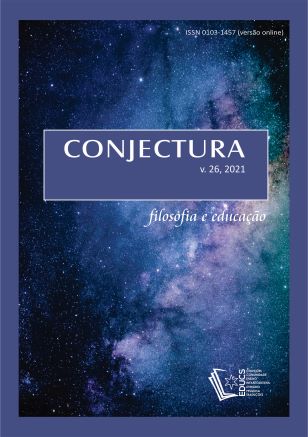Brutalizing or emancipation The relationship between teacher and student in the classroom from different frameworks
DOI:
https://doi.org/10.18226/21784612.v26.e021034Abstract
We aim in this article to dwell on the following questioning: in the relationship between teacher and student in the classroom, is it possible, through mutual reckoning, break with the principle of inequality of intelligence, which leads to brutalizing, rather than that lead to an education towards emancipation? To begin with, mainly based on Judith Butler (US, 1956), the process of mutual reckoning is described, and we endeavor to show that in the relationship between teacher and student as well as in other possible circumstances, mutual reckoning takes place according to some determined rules which limit the modes of reckoning. Then, with Jacques Rancière (Argel, 1940), we focus on the principle of the mentalities that, according to the FrenchArgelian philosopher, exists as unquestionable truth or unbreakable belief in the relationship between teacher and learner. Seen inside the box of inequality of mentalities, the relationship between teacher and student fits into polarized duos, in which case we have on one hand the teacher as sage and possessor of all knowledge, and on the other hand the student seen as stupid, a passive spectator, incapable of learning on his own and always depending on the teacher who will explain everything to him. In such terms, mutual reckoning becomes impossible. Last but not least, still working with Rancière, we display the principle of equality in mentalities, and dwell on the possibility of a breach in that principle, aiming at an education engaged not engaged with brutalizing and submission of the learner’s intelligence to that teacher, but with the emancipation of both, seen thenceforth as inter-actors in the classroom having the same level of intelligence.
Keywords: Reckoning. Fitting. Brutalizing. Emancipation.
References
AGAMBEN, G. O que é um dispositivo? In: ______. O que é o contemporâneo? e outros ensaios. Chapecó, SC: Argos, 2009. p. 25-51.
AMARAL, J. G. Lutas por reconhecimento, desrespeito e universidade: a atuação dos coletivos universitários de diversidade sexual para o enfrentamento à homofobia institucional. Revista Teoria & Sociedade, v. 2, n. 21, p. 229-262, 2013.
BUTLER. Judith. Relatar a si mesmo: crítica da violência ética. Belo Horizonte: Autêntica, 2015a.
BUTLER. Judith. Quadros de Guerra. Rio de Janeiro: Civilização Brasileira, 2015b.
BUTLER. Judith. Anseio de reconhecimento. Equatorial, v. 3, n. 5, p. 185-207, 2016.
DELEUZE, G. Qu´est-ce qu´un dispositif ? In: ______. Deux régimes de fous: textes et entretiens, 1975-1995. Paris: Minuit, 2003. p. 316-325.
FJELD, A.; TASSIN, E. Subjectivation et désidentification politiques: dialogue a partir d’Arendt et de Rancière. Ciência Política, v. 10, n. 19, p. 193-223, jan./jun. 2015.
FLICKINGER, H. G. A teoria do reconhecimento na práxis pedagógicas: a exemplo de conflitos entre diretrizes ético-morais. Revista Espaço Pedagógico, v. 18, n. 2, p. 220-233, 2011.
GUERREIRO, A., FERREIRA, R. A.T, Menezes, L., & MARTINHO, M. H. Comunicação na sala de aula: a perspectiva do ensino exploratório da matemática. Zetetiké, v.23, n. 2, p. 279-295, 2015. Disponível em: http://hdl.handle.net/1822/50936. Acesso em: 29 de out. 2019.
HEGEL, G. W. F. Ciencia de la Lógica. Buenos Aires: Hachette, 1968.
HEGEL, G. W. F. A fenomenologia do espírito. Petrópolis: Vozes, 1992.
JAEGGI, Rahel. Reconhecimento e subjugação: da relação entre teorias positivas e negativas da intersubjetividade. Sociologias, Porto Alegre, v. 33, p. 120-140, 2013.
LELO, T.; MARQUES, A. C. S. Democracia e pós-democracia no pensamento político de Jacques Rancière a partir das noções de igualdade, ética e dissenso. Revista Brasileira de Ciência Política, Brasília, n. 15, p. 349-374, set./dez. 2014.
LÉVINAS, E. Totalité et infini: essai sur l´exteriorité. La Haye: Nijholf, 1961.
MARQUES, A. C. S.; MARTINO, L. M. S.; CHARDEL, P. A. Les temporalités communicatives dans la rencontre ethique avec autrui: accueil, écoute et réponse chez Lévinas. Contracampo, Niterói, v. 38, n. 3, p. 41-53, dez. 2019/mar. 2020.
MARTINO, L. M. S.; MARQUES, A. C. S. A comunicação como ética da alteridade: pensando no conceito com Lévinas. Intercom, São Paulo, v. 42, n. 3, p. 21-40, set./dez. 2019.
MOREAU, D. Différence et désidentification: une théorie de l’émancipation éducative. Educação e Filosofia, Uberlândia, v. 31, n. 63, p. 1.475-1.495, set./dez. 2017.
NUERNBERG, A. H. Investigando a Significação dos Lugares Sociais de Professora e Alunos no Contexto de Sala de Aula. Dissertação de Mestrado. Programa de Pós-Graduação em Psicologia da UFSC. Florianópolis, 1999.
RANCIÈRE, J. La méthode de la scène. France : Editions Lignes, 2018.
RANCIÈRE, Jacques. O mestre ignorante: cinco lições sobre a emancipação intelectual. 2. ed. Belo Horizonte: Autêntica, 2005.
RANCIÈRE, Jacques. O espectador emancipado. São Paulo: Martins Fontes, 2012.
RANCIÈRE, J. Aux bords du politique. Paris: Gallimard, 1998.
RANCIÈRE, J. O desentendimento: política e filosofia. São Paulo: Ed. 34, 1996.
SÁ, Luana Aires Corrêa de. Narrativa de uma arte-educadora: entrelaçamentos de vida, desafios e inventividades docentes. Dissertação de Mestrado. São João Del-Rei, UFSJ, Departamento de Ciências da Educação, 2019.
Downloads
Published
How to Cite
Issue
Section
License
1. The publication of the originals will imply the assignment of copyright to Conjectura Journal.
2. Texts cannot be reproduced without authorization from the Journal after acceptance.









